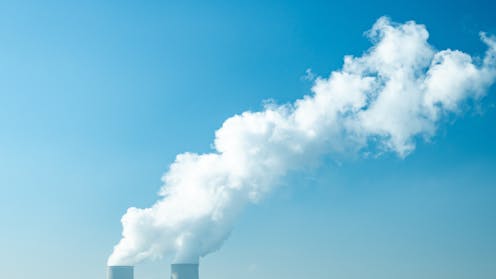Pie in the sky? After the Coalition’s stinging loss, nuclear should be dead. Here’s why it might live on
- Written by The Conversation

When the Coalition launched its nuclear plan last year, Labor was on the nose and early polls showed some support for the policy. But then the wheels fell off.
Nuclear didn’t stack up on cost or timeframe. Early support fell away. By the time of the election, support for maintaining Australia’s ban on nuclear power had increased from 51% to 59%.
When Opposition leader Peter Dutton gave his budget reply speech in late March, he barely mentioned the nuclear policy – instead promoting gas and attacking renewables.
After Saturday’s Coalition rout, the prospect of nuclear power in Australia should be dead and buried. But that’s not guaranteed. The National Party strongly backs nuclear power.
With metropolitan Liberals sceptical of nuclear reduced to a rump, the Nationals and regional Liberals will gain influence within the Coalition. If conservative Nationals prevail, we may well see the nuclear policy survive the election post-mortem and be resurrected for the next election.
Why did the Coalition back nuclear?
In the 1990s, the Coalition introduced laws banning nuclear power in Australia. But interest in the technology has never gone away. Australia has abundant uranium, and nuclear power appeals to some demographics.
Politically, Dutton’s choice to back nuclear power was pragmatic. There were real tensions inside the Coalition on climate action. Nuclear power seemed to offer a way past these tensions, as a zero emissions energy source providing baseload power. It would also have meant slowing the renewable rollout and building more gas power plants to cover the gap left by retiring coal.
It appears the nuclear policy wasn’t a Dutton priority. Nationals leader David Littleproud says he and the Nationals pushed the Coalition to adopt nuclear in exchange for continued support for the 2050 net zero target. After Saturday’s wipeout in Liberal-held metropolitan seats, the Nationals will have a stronger hand.
On Sky News yesterday, Littleproud claimed nuclear was not the reason for the Coalition’s loss. National MPs are still backing nuclear.
If the Nationals stick to their guns, we may see the Coalition bring nuclear to the next election.
Three-year federal terms make it difficult for new governments to embark on long term plans. Nuclear energy would take at least 15 years to come online. The Coalition’s last realistic opportunity to go nuclear would have been back in 2007, when there was renewed interest in the technology.
At that time, renewables were quite expensive. But solar, wind and batteries now cost much less, while nuclear was already expensive and has remained so.
Government tenders for renewable and storage projects tend to be massively oversubscribed, with far more interest than opportunities. By contrast, nuclear doesn’t have business backing. The Australian Industry Group has argued the Coalition’s nuclear policy was 20 years too late. This business reticence explains the Coalition’s proposal to build the nuclear reactors with public money.
This year, clean energy levels in Australia’s main grid will reach 44–46%, according to the Clean Energy Regulator. With a strong pipeline of new projects, that could reach 60% by the next election. It’s hard to see what role nuclear could have in any future grid.
Nuclear isn’t quite dead
In contrast to intermittent renewables, nuclear offers reliable zero emissions baseload power. If you talk to nuclear backers, you’ll likely hear a variant of this sentence.
But there’s “no going back” to the old baseload model where large, inflexible coal plants churned out power, as the head of the Australian Energy Market Operator Daniel Westerman pointed out last week. That’s because renewables are the cheapest energy source. Powering Australia on 100% renewables is possible with enough battery storage or pumped hydro to compensate for the solar duck curve, in which solar power drops off in the evening.
So why does nuclear have a hold on the Coalition’s imagination, even as it faces its largest crisis since Menzies founded the Liberal Party?
One likely reason is cultural opposition to renewables. This is especially evident among prominent Nationals such as Littleproud, Matt Canavan and Barnaby Joyce. As the thinking presumably goes, if “latte-sipping greens” in inner city areas back renewables, genuine country Australians should naturally oppose them.
It is, of course, not that simple. Renewables are often just as popular in the bush as in the cities. A Lowy Institute poll found almost two-thirds of regional respondents supported the government’s 82% renewable target for 2030. Farmers hosting solar panels or wind turbines energy generation on their properties see them as guaranteed income even if livestock or grains are having a bad year.
The problem for the Nationals and for the Coalition more broadly is that nuclear just isn’t that popular. Early support for the policy was soft. It melted away as authoritative sources such as the CSIRO pointed to the exorbitant cost and long timeframe to build reactors from scratch.
Labor, with a resounding majority, is likely to accelerate the shift to clean energy. While the urban-rural political divide will still play out in Coalition opposition to clean energy, Labor’s large electoral mandate and dominance in the populous cities will encourage it to press ahead.
As the surviving members of the Coalition lick their wounds and begin to figure out how they did so badly, we can expect to see nuclear up for discussion. But given the new power of the Nationals and regional Liberals in the party room, we may not have seen the last of nuclear fantasies in Australia.







